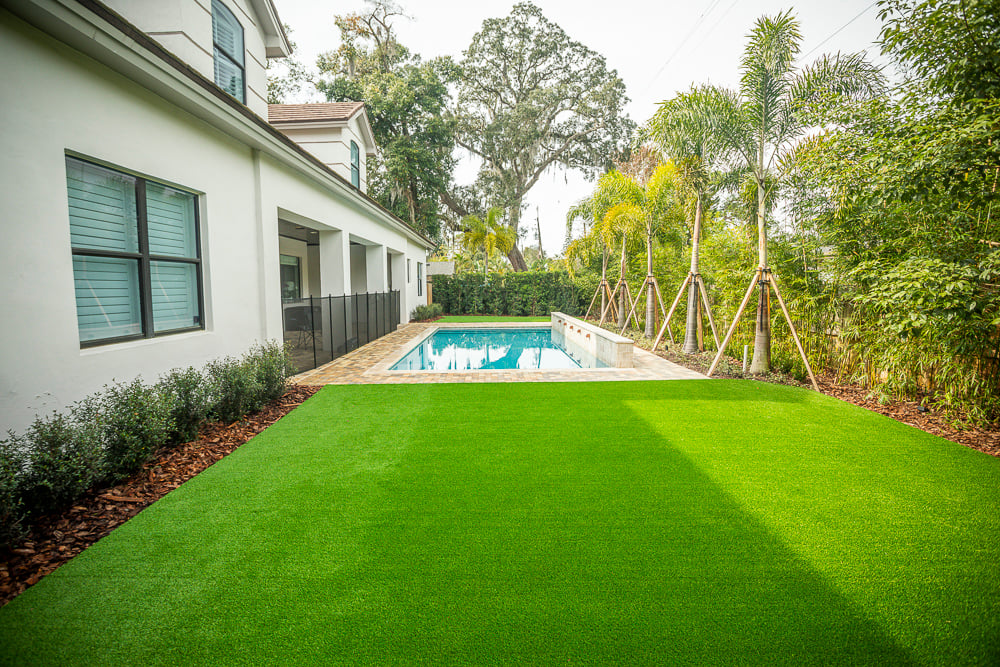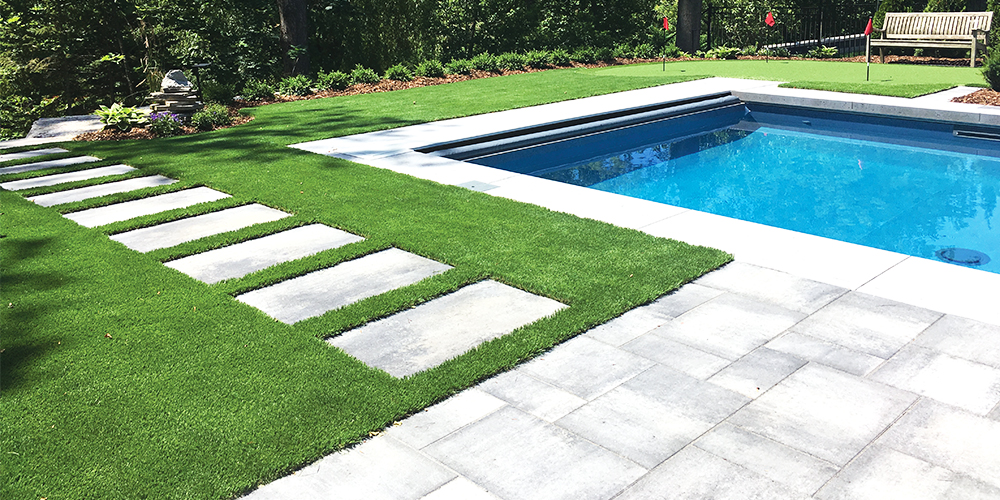Choose Reliable Artificial Turf Companies Phoenix for High-Quality and Realistic Grass
Choose Reliable Artificial Turf Companies Phoenix for High-Quality and Realistic Grass
Blog Article
See Why Homeowners Prefer Synthetic Grass for Lasting Landscaping Practices
As property owners progressively prioritize sustainability in landscaping, synthetic turf has emerged as an engaging option to standard turf. Its capability to conserve water, reduce maintenance initiatives, and decrease environmental impact placements it as a sensible selection for those seeking green options. Moreover, the aesthetic charm and adaptability of synthetic grass satisfy varied style preferences. The ramifications of this shift prolong beyond plain comfort and aesthetics, prompting a closer exam of exactly how these options influence more comprehensive environmental end results. What stays to be explored is the full extent of benefits that synthetic grass can offer to house owners and the environment alike.
Water Preservation Conveniences
One of the most substantial benefits of fabricated turf is its function in water preservation. In comparison, fabricated lawn removes this need totally, as it does not require irrigation.
Moreover, the setup of synthetic grass can add to a more lasting landscape. Home owners can dramatically decrease their water expenses, enabling reallocation of resources to other ecological campaigns or house usages. Furthermore, man-made grass is developed to withstand various climatic conditions without the need for supplementary watering, making it an excellent selection for regions facing water deficiency.
The environmental advantages expand past immediate water financial savings. By lowering water usage, synthetic lawn assists to mitigate the effects of environment change, preserving essential environments that are threatened by too much water extraction. As lasting landscaping techniques get traction, fabricated grass arises as an accountable option for property owners looking for to produce eco-friendly outside spaces.
Minimized Maintenance Initiatives
Synthetic grass dramatically minimizes upkeep efforts contrasted to traditional lawn yards. With artificial grass, home owners can eliminate the lengthy jobs related to all-natural landscape design, such as mowing, fertilizing, and weeding. This not only conserves important time but likewise lowers physical labor, making lawn treatment obtainable for individuals of any ages.
Among the most noteworthy benefits is the lack of regular mowing. Standard grass call for frequent trimming to preserve a cosmetically pleasing height, whereas synthetic grass continues to be consistently lavish without the need for cutting. Furthermore, home owners no much longer need to apply chemicals or plant foods, which are frequently needed to maintain all-natural lawn healthy and balanced. This change not just lightens the work yet likewise advertises a neater, more uniform appearance year-round.
Furthermore, synthetic grass is resistant and sturdy, requiring marginal maintenance beyond occasional cleaning and washing to remove particles. This simplicity of maintenance permits home owners to enjoy their outdoor rooms without the consistent concern of upkeep, offering even more time for leisure and family tasks. Eventually, the reduced upkeep efforts linked with synthetic grass make it an appealing alternative for those seeking a low-maintenance, aesthetically appealing landscape.

Environmental Effect Decrease
There is an expanding acknowledgment of the ecological benefits connected with man-made lawn, particularly in terms of water conservation and decreased chemical usage. Standard grass call for substantial amounts of water, particularly in drought-prone areas, bring about increased strain on local water resources. On the other hand, artificial turf gets rid of the requirement for irrigation, drastically reducing water consumption and promoting sustainability.
Additionally, conventional lawn upkeep often involves the application of herbicides, fertilizers, and pesticides, which can contribute to soil and water pollution. Synthetic grass minimizes this ecological risk by calling for marginal upkeep and practically eliminating the demand for unsafe chemicals. This not just enhances dirt wellness yet additionally secures local ecosystems from poisonous overflow.
Furthermore, the production of all-natural turf yards typically entails making use of fossil fuels for trimming and landscaping equipment, more adding to greenhouse gas exhausts. By choosing fabricated grass, property owners can considerably lower their carbon impact related to grass care tasks.
Aesthetic Allure and Adaptability
Along with its ecological advantages, synthetic grass provides considerable aesthetic allure and versatility for landscaping. House owners can attain a lush, eco-friendly look year-round, removing the seasonal variations commonly connected with natural turf. This constant visual not just boosts the visual appeal of a home yet additionally adds to a refined and properly maintained look.
Moreover, synthetic grass is offered in a range of appearances, designs, and shades, permitting modification to match specific choices and style themes - Phoenix turf companies. Whether utilized in household yards, industrial areas, or recreational areas, it can seamlessly incorporate right into diverse landscaping layouts, from contemporary minimal to lavish exotic settings
The versatility of artificial lawn prolongs beyond mere look; it can be installed in various areas, consisting of rooftops, patios, and also indoor spaces, developing chances for unique landscape design solutions. In addition, it appropriates for a range of tasks, from kids's play areas to pet-friendly settings, offering functionality without endangering style.
Ultimately, the visual allure and adaptability of synthetic grass make it an eye-catching option for homeowners looking for lasting landscaping services that like it do not give up appeal for ecological responsibility.

Long-Term Cost Cost Savings
One of the most engaging advantages of synthetic grass is its potential for long-term cost financial savings. Unlike all-natural yard, which requires normal maintenance-- including mowing, watering, feeding, and bug control-- synthetic turf considerably minimizes these ongoing expenditures. House owners can conserve a considerable quantity on water bills, especially in areas where water shortage is a pressing concern. The elimination of grass treatment services even more adds to monetary cost savings, as there is no need for customized tools or labor.
Additionally, synthetic grass has a lifespan of 15 to 25 years, depending upon its high quality and usage. This durability decreases substitute expenses, making it a more cost-effective choice in the future. Additionally, the first investment in artificial grass can frequently be redeemed through the savings built up gradually.
While the ahead of time cost may appear higher compared to turf installation, the advancing find this financial savings from reduced upkeep and water use frequently exceed these first expenses. Ultimately, the adoption of man-made lawn not only promotes a lasting landscape design solution but likewise supplies homeowners an economically savvy choice that lines up with lasting budgeting objectives.
Conclusion
Synthetic grass becomes an engaging alternative for sustainable landscaping, providing considerable benefits in water conservation, reduced maintenance efforts, and decreased environmental effect. Its visual charm and adaptability boost the aesthetic landscape while straightening with modern sustainability goals. Long-lasting expense savings contribute to its attractiveness for homeowners. As neighborhoods progressively prioritize ecologically friendly practices, the adoption of fabricated lawn stands for a modern step toward attaining lasting and resilient landscapes.
Additionally, fabricated grass is developed to withstand different climatic problems without the requirement for supplemental watering, making it an excellent option for regions dealing with water scarcity. (Turf installation phoenix az)

Fabricated grass emerges as a compelling alternative for lasting landscaping, providing significant benefits in water preservation, minimized upkeep efforts, and decreased environmental influence.
Report this page